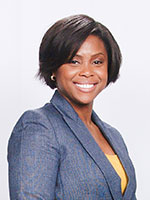

 Scientist and Educator
Scientist and Educator
Tiffany Channer, M.P.H. '13
School of Health Sciences and Practice
Blood Bank Educational Lead Medical Laboratory Scientist III / Safety Officer, Memorial Sloan Kettering Cancer Center
Tiffany Channer thought a degree in biochemistry would take her into the glamorous world of cosmetic and fragrance development. Then a chance encounter with a recruiter for a clinical lab science program changed her mind—and her life. Now a Lead Educational Medical Laboratory Scientist III at Memorial Sloan-Kettering Cancer Center, she was recently recognized by the American Society for Clinical Pathology for her outstanding achievements in and passion for pathology and laboratory medicine.
What’s a typical day like for you?
The short answer is that there is no typical day! Usually, I can be found working with students going through their clinical rotations. They come from clinical lab science programs throughout NYC and I’m responsible for teaching them the different processes of transfusion medicine. Or I’m monitoring inventory to ensure we have what we need for our patient population, which is constantly changing. Or—and this is the most critical task—I’m analyzing, preparing and supplying patients with the blood products they need, whether it’s a routine procedure or a STAT request from the OR.
No pressure!
Speed, accuracy and communication between the OR and the blood bank are key. So it’s stressful and can be very emotional. A story from my grad school days: I was working the 6 am – 2 pm shift in the lab and a patient started to bleed in the OR. The pneumatic tube we used to transfer the blood to the OR was clogged so I literally ran the units to the OR myself, praying that the patient would live and I’d make my train to Valhalla in time for class. Later I checked in at the hospital and learned that the patient had died. The last unit of blood he received was the one I had brought him. I cried… because, you know, we work hard to save every patient. That’s our mission.
What led you to the lab?
I studied biochemistry as an undergrad. It’s very challenging and by the time I took my first mid-term, I was a wreak. I studied for two weeks straight. No-Doz, coffee, all-nighters, hour and hours of studying. I left the exam in a daze and, by chance, wandered into an academic fair on campus. I just happened to run into a professor who taught clinical lab sciences. It was fate. The more she talked to me about the program, the more I was hooked. Later, I got to meet some of the students and I was so impressed. They had so much power. So many options—at CDC, NIH, here and around the world. So I applied, got in and it saved my life. And I conquered those biochemistry exams!
I started at Memorial Sloan Kettering right after graduation from Stony Brook in 2007. That July, the American Society for Clinical Pathology recruited me to work in Swaziland for PEPFAR (President Emergency Plan for AIDS Relief). This was the opportunity of a lifetime, a dream come true. I thought, this is what I went to school for.
At the time, 38% of that nation’s population was HIV+ and the health workers themselves were at risk from needle sticks and other unsafe laboratory practices. Our job was to teach them the safe way to handle the equipment and perform proper phlebotomy techniques.
It was a whirlwind two weeks and by the end of it, I realized that nothing can be done without policy. I needed to learn more to do more. Which is what led me to NYMC where I received my M.P.H. in health policy and management and a certification in global health.
You’re a career ambassador for ASCP. What does that involve?
I’m a big believer in giving back to the community so being an ambassador is just an extension of what I’d do naturally. It means being a good role model for the profession, showing students whose horizons may be somewhat limited that they have choices about their future. That with education and hard work anything is possible.
On my days off, I visit junior high and high schools around the city, teaching back-to-back classes (sometimes six in one day!) on genetics, basic blood bank science and the importance of healthy living and eating habits. I bring props—bags of fake platelets and red cells or test tubes full of “blood clot” candy. They start out a little squeamish but pretty soon they’re into it!
We talk about what I do in the lab and compare a real hospital with the Hollywood version they see on TV. I tell them, “When you hear a doctor say, ‘we’re waiting on the labs,’ you’re waiting for me!”
I share my life story and encourage them to strive to do their best. And then I tell them to know their blood type and donate blood!
Any advice for future alumni?
The future of medicine lies in the gene and more and more treatments will focus on the patient’s individual genotype. It’s a very dynamic and exciting specialty.
I also advise students to think creatively about their degree. There are many ways to put your education to use, so think outside the box and take the unconventional path. Find ways to give back to your community and to be an inspiration.
And finally, know your blood type and donate early and often! And here’s how: https://www.mskcc.org/about/get-involved/donating-blood.